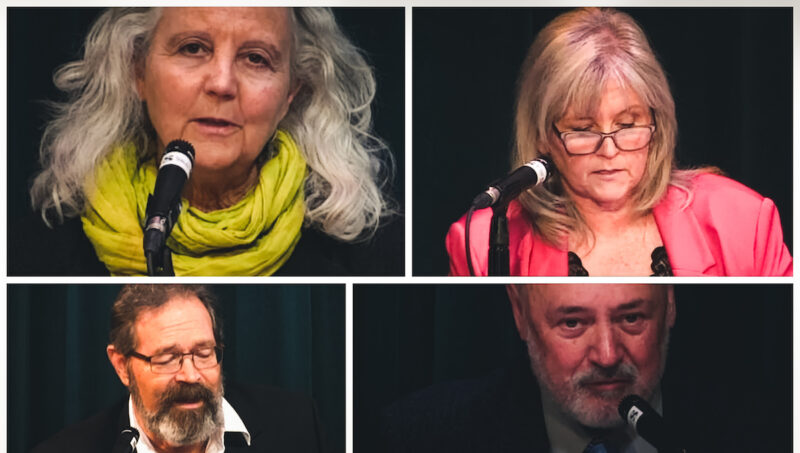Green Party candidate vows to disrupt economic lifelines on Vancouver Island
Anti-fish farm activist running for the Green Party in Northern Vancouver Island has an agenda that will likely kill thousands of jobs in the forestry and aquaculture industries.
By Fabian Dawson
SeaWestNews
Alexandra Morton, the Green party candidate for Vancouver Island’s North riding is vowing to disrupt the region’s top economic drivers – forestry and aquaculture – should she win a seat in the provincial election.
Morton, an anti-fish farm activist said if elected, she will work towards cancelling all salmon farming tenures in the ocean environment adding an emphatic “no” to supporting working forest legislation, during an all-candidates’ debate in Campbell River last night.
“She is an outsider who does not understand what aquaculture and forestry mean to the people of the area…there is really nothing constructive coming from Alexandra Morton,” said retired lawyer Brian Stamp, the co-chair of the Campbell River Business Recovery Taskforce, which recently issued an independent report on the region’s “first dollar” industries.
“The attractiveness of Campbell River, Northern Vancouver Island, must not be put at risk by lack of awareness or other narratives put forth by those who have no stake in this community,” stated the independent report, stressing that politicians need to listen to the locals about aquaculture, tourism and forestry, not only to the activists.
The North Vancouver Island riding has long been a New Democrat stronghold. They have won it nine out of the past 10 elections. Other candidates for the riding are Michele Babchuk (NDP), Norm Facey (Liberals) and John Twigg (Conservatives).
But it is Morton, who is viewed as the most polarizing candidate in a region that has an oversized reliance on the natural resource industry, particularly aquaculture and forestry.
According to the latest economic update by the BC Salmon Farmers Association (BCSFA), salmon farming in the North Island supports 1,786 direct jobs, providing $460 million in economic output while generating business for 823 local vendors.
The salmon farmers have also announced plans to immediately invest $113 million in aquaculture projects and generate nearly 450 new well-paid jobs, to help North Vancouver Island in its post COVID-19 recovery efforts. Translated that is $5.8 million in near-term annual tax revenue.
Babchuk said the NDP is supportive of the aquaculture industry as long as the farmers get First Nations consent to operate in their traditional territories on Vancouver Island, and if science shows that fish farms pose no more than a minimal risk to wild stocks.
The Department of Fisheries and Oceans (DFO) recently released nine peer reviewed scientific studies on pathogen transfer risk between wild and farmed fish in the waters off Campbell River that stated farmed salmon pose minimal risks to migrating wild stocks in British Columbia.
Morton has been decrying the studies on her social media posts and media interviews claiming that DFO was in collusion with the salmon farmers and that the science could not be believed.
However, in the debate yesterday, she hailed the “groundbreaking” science by DFO saying it can “actually allow salmon to speak to us through reading their immune systems so we can end up with a vibrant aquaculture industry and we will also get our wild salmon back.”
Both Facey and Twigg said Morton’s push to get salmon farmers to grow fish on land is not feasible because it will increase greenhouse gas emissions and force the industry to move away from the area to be closer to big markets in the US.
In BC alone, moving the current production of Atlantic salmon to land based tanks on Vancouver Island will result in an increase 22,881,000 kgs of Greenhouse Gas (GhG) emissions, a recent study said. That is equivalent to the energy needed per year to power a population of 52,200 or a city the size of North Vancouver.
Morton is also not a fan of the logging industry in the region saying she will not support the planned working forest legislation.
Stamp, of the Campbell River Business Recovery Taskforce, estimated that the forestry industry pumps around $250 million annually into the local economy.
“In this election we need to know the price we will be paying if the gospel of Morton, which wants to shut down aquaculture and severely restrict logging, is to prevail,” he told SeaWestNews.
“How do we attract young people to come, live and work here without these first dollar industries that provide the taxes for our schools, roads, medical facilities and community amenities.”
His sentiments were echoed by many Vancouver Island residents on the Facebook page of the Campbell River Mirror.
“How will you replace all these aquaculture jobs you’re so interested in culling Morton? Seems like your (sic) pushing your next documentary instead of saving industry in the north,” posted Phil Winspear, owner of Willow Point Floors.
“Salmon farming and its profits give me the privilege of supporting our local economy. There are a lot of us under 35 who will migrate away from Campbell River if our jobs are eliminated. This is what gives us the opportunity to live, work and play right here,” said Renée Michelle Hamel.
Image (top left) Alexandra Morton, (top right) Michele Babchuk, (bottom left) Norm Facey, (bottom right) John Twigg

